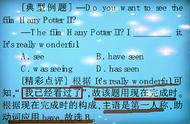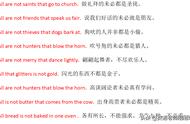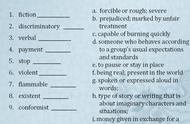
(1) how often有“多久一次”的意思,是就做某事的频率提问。常用“Twice a year.”,“Three times a week.”等回答。如:
—How often do you watch TV?
你多久看一次电视?
—Three times a week.每周三次。
(2) how long表示 “时间多久或物体多长”, 表示时间侧重指 “一段时间”。针对 “how long” 的回答一般是时间段,如 “for three days”, “three years”。如:
—How long did he stay here?
他在这儿待了多久?
—About two weeks.
大约两个星期。
—How long is the river?
这条河有多长?
—About 500 km.
大约500千米。
(3) how soon表示 “多久之后”,主要用来对表示将来的一段时间提问。how soon的回答一般是:in 时间段。如:
—How soon will he be back?
他要多久才回来?
—In an hour.
一小时以后。
(4) how far 是提问“路程有多远”,询问距离。如:
How far is it from his house?
距离他家有多远?
2.too, enough, so同作副词,用法不同(1) too作副词,用在“too... to”结构中, too... to结构中的动词不定式部分为否定意义,意为“太……而不能……”。如:
He is too young to go to school.
他年龄太小了不能上学。
(2) enough用作副词时,意为“足够”,“形容词或副词原级 enough to”结构意为“足以能够”,是肯定意义。如:
He is old enough to go to school.
他到了上学的年龄了。
(3) so意为“如此”,用于“so... that... (如此……以至于……)”,so后接形容词或副词,that后面加从句。如:
He is so old that he can't go on working.
他年龄太大,不能继续工作了。
3.already, still, yet用法巧辨析(1) already通常用于完成时的肯定句中,表示“已经”。如:
I have already seen the film.
我已经看过这部电影了。
(2) yet用来谈论某事是否已经发生,多用于疑问句和否定句中。在疑问句中,意为“已经”,在否定句中意为“还,尚”,通常放在句末;not yet可用于简略回答,意为“还没有”。如:
He hasn't finished reading the book yet.
他还没有读完这本书。
—Have you finished your homework?
你完成家庭作业了吗?
—No,not yet.
不,还没有。
(3) still意为“仍然,还”,强调过去发生的事情及存在的状况目前还在延续。在现在进行时中,still只表示动作正在持续。如:
He's still living with his mother.
他仍与母亲住在一起。
4.either, also, too用法“也”不同(1) also用于肯定句,常用在实义动词前be动词后。如:
He also attended the meeting yesterday.
昨天他也参加了会议。
He is also a scientist.
他也是科学家。
(2) too用于肯定句,在句末,too前须有逗号。如:
He can swim,too.他也会游泳。
(3) either用于否定句,通常放在句末,之前需加逗号。如:
He didn't attend the meeting,either.
他也没去参加会议。
5.ago, before“以前”差别大(1) ago表示“从现在起若干时间以前”,常与动词一般过去式连用,而且ago只能作副词。如:
He left Shanghai three days ago.
他三天前离开了上海。
(2) before表示“从过去某时起若干时间以前”,常与过去完成式连用。before既可作副词又可作介词和连词。如:
I had finished the work two days before.
两天前我已完成了工作。(副词)
I visited him two days ago,but he had gone to Paris five days before.
我于两天前去访问他,可是他已于那日5天前赴巴黎去了。(副词)
6.much too, too much词序颠倒,意不(1) too much可以用作副词,也可以形容词,意为“太多、过于”。用作副词时,在句中作状语。如:
Watching TV too much is bad for your eyes.
看电视太久,对你的眼睛不好。
His father was too much surprised to see him here.
他的爸爸看到他在这儿非常吃惊。
too much用作形容词时,常用来修饰不可数名词。如:
He drank too much beer last night.
他昨晚酒喝得太多。
Please don't waste too much money.
请不要浪费太多的钱。
too much用作名词时,在句中作主语、宾语或表语。如:
Too much was happening all at once.
同时发生的事太多了。
Mike,you have eaten too much. You can't eat any more.
迈克,你吃得太多了,你不能再吃了。
It's too much for me.
这个我干不了。
(2) much too用作副词时,通常用来修饰形容词或副词,意为“极其、非常、实在太”。如:
This problem is much too difficult for me to work out.
这个问题非常难,我算不出来。
This shirt is much too expensive for him.
这件衬衫对他来说,实在太贵了。
7.hard与hardly的用法区别(1) 当hard用作副词时,意为“努力地、困难地、猛烈地”等。
如:
Does Tom work hard at his lessons?
汤姆学习努力吗?
It`s raining hard outside now. Don't go out.
现在外面正下着大雨,不要出去。
(2) hardly并不是hard加上后缀所构成的副词,hardly只能用作副词,意为“几乎没有、几乎不”。
如:
I can hardly see anything on the blackboard.
我几乎看不见黑板上的任何东西。
My father hardly ever watches TV.
我爸爸几乎不看电视。
练一练在近几年中考英语试题中,对副词的考查主要集中在副词的辨析用法、副词比较等级、副词与形容词的选择等,同时也涉及到含有副词的习惯用法和固定短语。题目设计更加注重语境创设,考查学生在特定语境中运用副词的能力。复习过程中需要重点掌握以下内容:
1. 副词词意辨析副词词意辨析是中考副词考查的主要内容,要求考生熟记常用易混副词的辨析,能结合具体语境准确使用副词。
【例】(2013·江苏无锡·2)
—Look at the bird over there! It's so beautiful!
—Wow! It's a rare crane. It appears in this area.
A. always B. usually C. seldom D. often
【解析】考查副词词义辨析。always总是;usually通常;seldom很少;often经常。由前半句“哇,是丹顶鹤”可知在这儿是很少出现这种鸟。故选C。
【答案】C
2. 副词比较等级中考对于副词的考查集中在原级、比较级和最高级的基本句型上,这是中考重点考查的知识点。具体来讲,特别要注意下面几点:
(1) 判断句子是原级、比较级还是最高级;
(2) 根据句子的意思来判断考查的副词是哪种比较等级;
(3) 能够根据句子中的一些修饰语做出正确判断。
【例】(2013·广东茂名·30)
you hit the horse, it will go.
A. Hard; fast
B. The hard; the fast
C. The harder; the faster
【解析】考查副词的比较级。句意:你越使劲拍马,它跑得越快。“the 比较级,the 比较级”表示“越……就越……”。故选C。
【答案】C
3. 动词 副词【例1】(2014·广东广州·22)—Do you want to eat here?
—No. Just fish and chips to , please.
A. get away B. take away
C. send away D. throw away
【解析】考查动词 副词away的辨析。get away离开,逃跑;take away带走,外带;send away解雇;throw away扔掉。根据题目,选择take away,表示食物需要外带。
【答案】B
【例2】(2014·浙江温州·7)
—Don't late,Mary. You have a singing competition tomorrow morning.
—Ok,dad. I'll go to bed right now.
A. dress up B. grow up
C. stay up D. mix up
【解析】考查动词 副词up的辨析。dress up打扮;grow up长大;stay up熬夜;mix up混合。由应答句判断,爸爸叫不要熬夜,不是不要打扮、长大或混合,因为明天上午参加歌咏比赛。故选C。
【答案】C
4. 连接副词/词组的辨析用法连接副词/词组通常用来连接宾语从句。常见的有:when; where; how; why等。与不定式构成不定式短语时,该连词就转换成疑问副词,在句中作主语、宾语、状语或宾语补足语。不定式短语结构可以与宾语从句互换使用。
【例】(2014·浙江湖州·19)
—Excuse me,Sir. is it from here to the nearest shopping mall?
—Well,only about five minutes walk.
A. How often B. How long
C. How far D. How soon
【解析】考查疑问短语用法。句意:——劳驾先生,这里离最近的购物中心有 ? ——哦,大约步行5分钟的路程。How often多久一次,常对频度提问;how long多长时间,常对一段时间提问;how far多远,常对距离、路程提问;how soon多久,对一般将来时间提问。分析句意可知:是对路程提问,故选C。
【答案】C
,声明:整理自网络













